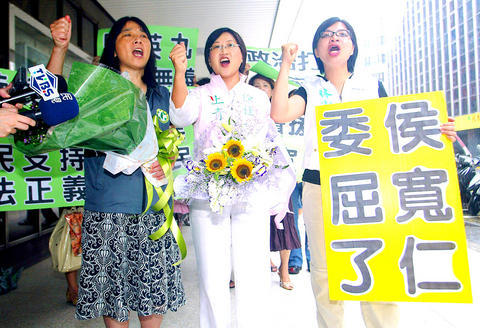The Taipei District Prosecutors' Office yesterday decided to appeal the Taipei District Court's ruling on former Taipei mayor Ma Ying-jeou's (
Ma, the Chinese Nationalist Party's (KMT) presidential candidate, was accused of misappropriating NT$11 million (US$333,000) from his mayoral special allowance fund during his eight-year tenure as Taipei mayor. He was found not guilty of corruption on Tuesday by the Taipei District Court.
Yesterday, Taipei District Prosecutors Office spokesman Lin Jinn-tsun (

PHOTO: CNA
The Taipei District Prosecutors Office made the decision after a meeting yesterday afternoon, Lin said.
Reasons for the appeal include the court's interpretation of the definition of special allowances and its criticism of Prosecutor Hou Kuan-jen (侯寬仁), who was in charge of the case, Lin said.
Judges accused Hou of deliberately mistranscribing a trial witness' statements.
Taipei District Court judges are unfamiliar with investigation practices and they misunderstood Hou's actions in the case, Lin said.
In the trial, Ma admitted he had taken half of his monthly special mayoral allowance for personal use, but said he believed that government officials' special allowances should be treated as income, not as public funds.
The court on Tuesday ruled that government officials' special allowances should be treated as a substantial subsidy, or income, so Ma had not embezzled public funds.

MAKING WAVES: China’s maritime militia could become a nontraditional threat in war, clogging up shipping lanes to prevent US or Japanese intervention, a report said About 1,900 Chinese ships flying flags of convenience and fishing vessels that participated in China’s military exercises around Taiwan last month and in January have been listed for monitoring, Coast Guard Administration (CGA) Deputy Director-General Hsieh Ching-chin (謝慶欽) said yesterday. Following amendments to the Commercial Port Act (商港法) and the Law of Ships (船舶法) last month, the CGA can designate possible berthing areas or deny ports of call for vessels suspected of loitering around areas where undersea cables can be accessed, Oceans Affairs Council Minister Kuan Bi-ling (管碧玲) said. The list of suspected ships, originally 300, had risen to about 1,900 as

DAREDEVIL: Honnold said it had always been a dream of his to climb Taipei 101, while a Netflix producer said the skyscraper was ‘a real icon of this country’ US climber Alex Honnold yesterday took on Taiwan’s tallest building, becoming the first person to scale Taipei 101 without a rope, harness or safety net. Hundreds of spectators gathered at the base of the 101-story skyscraper to watch Honnold, 40, embark on his daredevil feat, which was also broadcast live on Netflix. Dressed in a red T-shirt and yellow custom-made climbing shoes, Honnold swiftly moved up the southeast face of the glass and steel building. At one point, he stepped onto a platform midway up to wave down at fans and onlookers who were taking photos. People watching from inside

Japan’s strategic alliance with the US would collapse if Tokyo were to turn away from a conflict in Taiwan, Japanese Prime Minister Sanae Takaichi said yesterday, but distanced herself from previous comments that suggested a possible military response in such an event. Takaichi expressed her latest views on a nationally broadcast TV program late on Monday, where an opposition party leader criticized her for igniting tensions with China with the earlier remarks. Ties between Japan and China have sunk to the worst level in years after Takaichi said in November that a hypothetical Chinese attack on Taiwan could bring about a Japanese

The WHO ignored early COVID-19 warnings from Taiwan, US Deputy Secretary of Health and Human Services Jim O’Neill said on Friday, as part of justification for Washington withdrawing from the global health body. US Secretary of State Marco Rubio on Thursday said that the US was pulling out of the UN agency, as it failed to fulfill its responsibilities during the COVID-19 pandemic. The WHO “ignored early COVID warnings from Taiwan in 2019 by pretending Taiwan did not exist, O’Neill wrote on X on Friday, Taiwan time. “It ignored rigorous science and promoted lockdowns.” The US will “continue international coordination on infectious